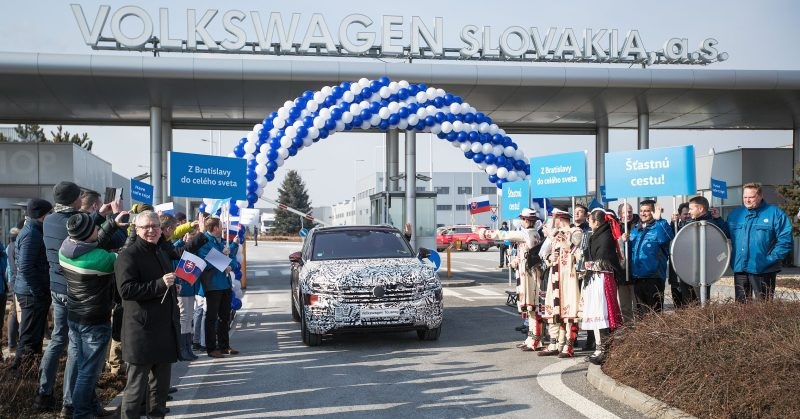Slovakia is advancing in the transition to electromobility, bringing about changes in the automotive sector, a significant industry in the country.
Currently, it is the third-largest automobile producer in Europe, behind Germany and France, according to the International Trade Administration.
As automakers invest in the shift to electric vehicles in the country, some workers fear losing their jobs.
One such case is Volkswagen AG, which will start producing fully electric SUV models after 2025 in the nation.
Given Slovakia’s prominent position in European automotive production, the number of workers involved is considerable.
The challenge lies in the fact that the shift toward electric vehicles may have ripple effects on employment.
Within the country’s automotive sector, up to 85,000 jobs are expected to be at risk with the transition to electromobility, according to a study by GLOBSEC, a non-governmental and non-partisan organization of local experts.
“If we don’t achieve this transformation, we will have a problem with employment,” said Alexander Matusek, president of Slovakia’s automotive industry lobbying group.
However, the potential decrease in jobs due to technological changes is offset by the opening of new eMobility companies.
For instance, Slovakia is already making headlines with the announcement of its future site for gigafactories producing lithium-ion batteries.
Chinese company Gotion High Tech and its Slovak partner InoBat signed a memorandum to build an electric vehicle battery plant.
The alliance aims to start production at the plant in 2026, initially with a combined annual production of 20 gigawatt-hours, as announced by the Ministry of Economy.
It’s worth noting that Gotion is a supplier to the Volkswagen brand.
The plant will be located in Surany, 93 kilometers east of the capital, Bratislava, and will create up to 1,500 jobs.
Peter Willemsen, Chief Operating Officer at Gotion Global, posted on a Mobility Portal Europe LinkedIn post that “the project is 100% secured.“

In this regard, Patrik Križanský, Director at SEVA, stated in a conversation with Mobility Portal Europe: “The transition to electromobility could benefit Slovakia’s automotive industry, provided investments are made in research, development, and local battery production capabilities.”
On another front, Volvo is building a new plant that will produce electric vehicles starting in 2026.
The facility will be constructed near the city of Kosice in the eastern part of the country.
Furthermore, other Original Equipment Manufacturers (OEMs) are already investing in new models.
Last year, Stellantis launched a new electric Citroën ë-C3, which will be produced at its Slovak facilities.
Meanwhile, Volkswagen is preparing its facilities for the launch of an electric Porsche model.
Another Porsche-owned factory is investing 1 billion euros in the production of battery modules.
“These are examples of a longer list of investments in the electric transformation of the country’s automotive industry,” said Križanský.
In this context, state authorities are preparing for workers to migrate from one sector to another.
Slovakia would reach 39% EVs within six years
Currently, Slovakia has only three percent of low-emission vehicles out of its total car fleets.
Quantitatively, the country has around 10,000 battery electric vehicles.
These figures demonstrate that the numbers of sustainable transportation in the country are low within the European context.
However, the Slovak Electric Vehicle Association (SEVA) projects to accelerate the growth rate of electric vehicle registrations to ten percent by 2025 and up to 39 percent by 2030.
Consequently, the national government approved an update to its 2019 Action Plan for the Development of Electromobility in mid-2023.
The document outlines goals to reduce the share of emissions in transport, prepare the automotive industry for transformation, speed up the evolution of alternative propulsion units in transport, and promote electromobility.
The legislation includes a series of measures divided into three categories: financial, legislative, and supportive.
The Slovak government allocates €50 million for charging infrastructure
According to the official SEVA page, there are currently a total of 1,800 charging stations distributed throughout the national territory.
To boost their development, the Slovak Recovery Fund allocated 50 million euros.
The goal is to expand public charging points with at least 3,000 new units by the end of 2026.
Read more: SEVA: “The Slovak government’s support for the purchase of EVs needs to be more robust”







